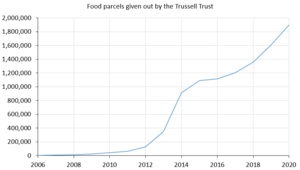The Trussell Trust facts for kids
 |
|
| Founded | 1997 |
|---|---|
| Founder | Paddy Henderson Carol Henderson |
| Type | |
| Registration no. |
|
|
Area served
|
United Kingdom |
| Products | Food Parcels |
| Method | Food banks |
|
CEO
|
Emma Revie |
|
Employees
|
120+ |
|
Volunteers
|
28,000 |
Trussell is a charity that works to end the need for food banks in the United Kingdom. It helps people who are struggling to afford food. The charity supports a large network of about 1,700 food bank centers. These centers provide emergency food and caring support to people in difficult situations. Trussell also campaigns for big changes to stop people from falling into poverty. Its main office is in Salisbury, England.
Contents
History of Trussell
The Trussell Trust was started in 1997 by Paddy and Carol Henderson. They used money left by Carol's mother, Betty Trussell. At first, the charity helped children in Bulgaria who were sleeping at a railway station.
In 2000, they began working in the UK too. They opened the first food bank in their hometown of Salisbury. This happened after a mother contacted them because she was finding it hard to feed her children. In 2024, the organization changed its name to Trussell. It also updated its look, but its official name is still The Trussell Trust.
How Trussell Helps
Food Banks: Providing Emergency Food
Trussell runs many food bank centers across the UK. From April 2024 to March 2025, they had 1,711 centers. These centers give emergency food and support to people who are experiencing poverty. Trussell's food banks provide about two-thirds of all emergency food help in the UK.
In 2022–23, Trussell food banks gave out nearly 3 million food parcels. This was a big increase from previous years. Over half a million of these parcels went to children.
People often need food banks because their income is not enough to cover basic costs. Other reasons include delays in getting money they are owed or changes to their benefits. Benefits are payments from the government to help people.
Food banks get non-perishable food donated by the public. Non-perishable means food that doesn't spoil quickly, like canned goods or pasta. Donations come from schools, churches, businesses, and supermarkets. Over 28,000 volunteers sort this food into emergency parcels.
People get a food bank voucher from professionals like doctors or social workers. This voucher allows them to receive a food parcel. Each parcel contains three days' worth of healthy, non-perishable food. Food banks also offer kind support and connect people with other groups that can help them long-term. This helps people avoid needing food banks again.
Research and Campaigns: Working for Change
Trussell also studies why people need food banks in the UK. They use this information to campaign for changes. Their goal is a future where no one needs a food bank. They collect information from their food banks to understand the problem better.
Trussell regularly shares data about food bank use. They have a big research project called "State of Hunger." This project looks deeply into why people experience hunger in the UK. The first report from this project was released in November 2019.
Trussell supports other charities that work for similar goals. They have their own campaign called #5WeeksTooLong. This campaign asks for an end to the five-week wait for the first Universal Credit payment. Universal Credit is a government benefit. Many organizations support this campaign.
In November 2023, Trussell calculated how much money a single adult in the UK needs to live a decent life. They found it was at least £29,500 a year. This was up from £25,000 in 2022. For two adults with two children, they would need £50,000, up from £44,500 in 2022. Trussell found that about 19.2 million people in the UK live in households that earn less than this minimum amount.
See also
- 2021–present United Kingdom cost-of-living crisis
- FareShare
- Fuel poverty in the United Kingdom
- Hunger in the United Kingdom
- List of food banks
- Poverty in the United Kingdom


